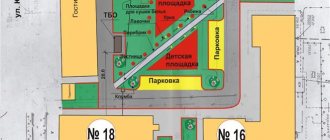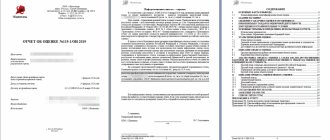According to Article 12 of Federal Law No. 135-FZ “On Valuation Activities in the Russian Federation”: “the final value of the market or other value of the valuation object, determined in the report, with the exception of the cadastral value, is recommended for the purposes of determining the initial price of the subject of an auction or competition, or making a transaction within six months from the date of preparation of the report , except for cases provided for by the legislation of the Russian Federation.”
Thus, if your assessment report was compiled on January 1st, you have the right to use it for 6 months until June 30th. It is important to note here that many people confuse the reporting date with the valuation date. The date of assessment may not coincide with the date of the report. The legislation on valuation activities strictly states that it is necessary to look specifically at the date of preparation of the report.
How it works in practice
If you read the law and the standard carefully, it turns out that although the “expiration date” is indicated, it is indicated only as RECOMMENDED.
In practice, the validity period of the assessment report is most often determined at the discretion of the specialist who requested it from you.
For example, if you need an appraisal for a mortgage (appraisal of an apartment for a mortgage), then it is better to clarify this issue with a bank employee, just in case.
It happens that a bank employee is ready to accept an assessment report “not older than” 1, 2 or 3 months. And there is no way to convince him. After all, the Law “On Valuation” and the valuation standards stipulate the RECOMMENDED shelf life of the report. Recommended is not mandatory, but desirable, that is, it can be neglected if something happens.
Therefore, an employee of a bank or other organization demanding an appraisal report from you can interpret the law and the appraisal standard in his favor and nothing can be done about it.
According to the Procedure for assessing the vulnerability of technical equipment and vehicles, approved by Pr. MT No. 87 dated April 12, 2010.
1. The procedure for assessing the vulnerability of technical equipment and vehicles (hereinafter referred to as the Procedure) was developed in accordance with Parts 1 and 6 of Art. 5 Federal Law No. 16.
2. A vulnerability assessment of the OTI and/or CU (hereinafter referred to as the vulnerability assessment) is carried out in order to determine the degree of protection of the OTI and CU from potential threats of ANV in the activities of the OTI and CU.
3. During the vulnerability assessment, the following is carried out:
3.1. Regarding OTI and TS:
3.1.1. Studying:
- technical and technological characteristics of OTI or TS (including geological, hydrological and geographical features of OTI dislocation);
- organization of their operation (functioning).
The result of the study is:
- description of the technical and technological characteristics of the OTI or vehicle (including geological, hydrological and geographical features of the OTI dislocation), as well as the organization of their operation (functioning);
- determination of the boundaries of the NTD and the list of critical elements of the transport infrastructure facility or vehicle.
3.1.2. Study of the system of measures taken at the OTI or vehicle to protect against ANV.
The result of the study is:
- description of the system of measures taken by STI at OTI and/or vehicles to protect against ANV;
- assessment of its (system of measures taken) compliance with OHS requirements (PP No. 410 or PP No. 495) OTI and TS.
3.1.3. Studying ways to implement potential threats of committing ANV in the activities of OTI and TS using a set of information about the number, equipment, preparedness, awareness, as well as the actions of potential violators, the goals pursued when committing ANV in the activities of OTI and TS (hereinafter referred to as the violator model).
The result of the study is a description of ways to implement potential threats of committing ANV into the activities of OTI or TS in relation to the model of the violator.
3.1.4. Determination of recommendations from the STI regarding measures that need to be additionally included in the system of measures for OSH and/or TC.
The result of determining the recommendations is a description of additional measures that need to be taken by the STI at the OTI and/or vehicle in accordance with the OHS requirements.
4. Vulnerability assessment is carried out:
- OTI - specialized organizations;
- TS - specialized organizations or STI.
Vulnerability assessment is carried out:
- taking into account the list of potential threats of committing ANV in the activities of OTI and TS;
- using the intruder model.
5. The period for conducting a vulnerability assessment should not exceed 1 month.
6. Results of the vulnerability assessment:
- drawn up in the form of a text document with graphic plans and diagrams in 3 copies:
1st and 2nd copies on paper;
3rd - on electronic media;
- sent to Roszheldor for consideration and decision on approval.
It is allowed to present the results of the vulnerability assessment, executed in 2 copies:
- 1st copy on paper;
- 2nd copy on electronic media - signed with an enhanced qualified electronic signature.
7. When assessing the vulnerability of a group of vehicles identical in their design, technical, technological characteristics, owned by one legal (individual) person or used by him on another legal basis, at his request, the results of the vulnerability assessment of one vehicle are extended to the entire group.
The list of vehicles included in this group is submitted by the STI to Roszheldor before assessing the vulnerability of the vehicle.
8. The decision to approve the results of the vulnerability assessment or to refuse to approve them is made by Roszheldor within a period not exceeding 30 days.
8.1. The decision is drawn up in the form of a conclusion and approved by the head of Roszheldor (or his authorized person).
8.2. Copies of the results of the vulnerability assessment, approved by the head of Roszheldor (or his authorized person) and certified by the official seal, are sent (delivered to):
- 1st - to specialized organizations or STI in the case of an assessment of the vulnerability of a vehicle by subjects of transport infrastructure;
- 2nd and 3rd - remain in Roszheldor, from which documentary and electronic databases are formed.
When presenting the results of the vulnerability assessment in two copies:
- The first copy of the results of the vulnerability assessment, approved by the head of Roszheldor (or his authorized person) and certified with the official seal, is sent (handed over) to specialized organizations or STI in the case of a vehicle vulnerability assessment by transport infrastructure entities;
- The 2nd copy, from which the electronic database is formed, remains in Roszheldor.
8.3. The decision to refuse to approve the results of the vulnerability assessment is sent (handed over) to specialized organizations or STI in the case of a vehicle vulnerability assessment by transport infrastructure entities:
- in writing, indicating the reasons for the refusal;
- along with the 2nd copy.
What to do?
To avoid unpleasant situations and surprises, check in advance with a specialist from the organization requiring the report:
- what is the validity period of the real estate assessment in their opinion;
- what form the report should be in;
- on what date and how much time is allowed between drawing up the report and submitting it to this specialist, and so on.
Experience suggests that it is usually useless to argue. To save time and nerves, do as the employee who requested the evaluation report tells you.
Once again about the examination of assessment reports
The legislative framework
In accordance with the legislation of the Russian Federation, mandatory examination of assessment reports is carried out in the following three cases.
1. According to Article 130 “Valuation of the debtor’s property” of the Federal Law of October 26, 2002 N 127-FZ “On Insolvency (Bankruptcy)”, the body authorized[1] to prepare opinions on appraisers’ reports checks the assessment report and prepares a reasoned conclusion containing justification for the non-compliance of the valuation report with the legislation of the Russian Federation on valuation activities, federal valuation standards or the unreliability of information used in the valuation report, which is sent to the insolvency practitioner and to the self-regulatory organization of appraisers (hereinafter referred to as SROO), of which the appraiser who compiled this report is a member. The SROO is obliged to submit to the insolvency practitioner and the authorized body an expert opinion on the assessment report justifying its compliance or non-compliance with the above requirements.
If the SROO has provided an expert opinion on the non-compliance of the assessment report with the requirements for this report, the market value of the property determined in accordance with this report is considered unreliable and cannot be used to approve the initial sale price of the debtor's enterprise or other property of the debtor.
2. According to Article 77 “Determination of the price (monetary valuation) of property” of the Federal Law of December 26, 1995 N 208-FZ “On Joint-Stock Companies” “if the owner of 2 to 50 percent inclusive of the voting shares of the company is the state and (or) municipal formation and determination of the price (monetary valuation) of property, the placement price of the company's issue-grade securities, the repurchase price of the company's shares (hereinafter referred to as the price of the objects) in accordance with this article is carried out by the board of directors (supervisory board) of the company, notification of the federal executive body is mandatory, authorized by the Government of the Russian Federation, on the decision taken by the board of directors (supervisory board) of the company to determine the price of objects.” A copy of the appraiser's assessment report is submitted to the authorized body1 if his involvement to determine the price of objects in accordance with this Federal Law is mandatory, and in other cases if an appraiser was involved to determine the price of objects. The authorized body, if it decides that the assessment report prepared by the appraiser does not comply with assessment standards and legislation on appraisal activities, has the right to send a reasoned conclusion to the self-regulatory organization, of which the appraiser who carried out the assessment is a member, to carry out its examination.
If the SROO is prepared based on the results of the examination of a negative conclusion, the price of the objects determined by the board of directors (supervisory board) of the company in accordance with this article is recognized as unreliable.
3. According to Article 7 of the Federal Law of 01/05/2006 N 7-FZ “On Amendments to the Federal Law “On Joint Stock Companies”, Articles 84.7 and 84.8 of the Federal Law “On Joint Stock Companies”, when redeemed by a person who acquired more than 95 percent of the shares of an open company, securities of an open company at the request of this person or the owners of the remaining shares, the price of the repurchased securities in the cases provided for by this article cannot be lower than the value determined by an independent appraiser in the report on the valuation of securities and confirmed by the self-regulatory organization during the examination of such a report. The procedure for conducting an examination of a report on the valuation of securities, as well as the requirements and procedure for selecting the SROO that carries out the examination, are determined by the federal executive body that regulates valuation activities.
Unlike the first two cases, the examination can be carried out by an SROO, of which the appraiser who compiled the report is not a member.
Thus, in all three cases of mandatory examination provided for by law, the examination is aimed, first of all, at checking the value determined in the assessment report, as part of checking the appraiser’s compliance with legal requirements. At the same time, there is no unified approach to making a decision based on the results of the examination: in the first case, this is the recognition of the unreliable value obtained in the report, in the second, the price established on the basis of the assessment report, in the third, the result of the examination should be confirmation of the value in the report.
The procedure for conducting an examination of assessment reports
The legislator has not established a uniform procedure for conducting an examination of assessment reports. According to clause 11 of the Federal Valuation Standard No. 1[2] “When conducting an examination of an appraisal report, a set of measures is carried out to verify the appraiser’s compliance with the requirements of the legislation of the Russian Federation on appraisal activities and the appraisal agreement, as well as the sufficiency and reliability of the information used when assessing the appraisal object. , the validity of the assumptions made by the appraiser, the use or refusal to use valuation approaches, coordination (generalization) of the results of calculations of the value of the valuation object when using various valuation approaches and valuation methods.”
The terms of sufficiency and reliability are disclosed further in clause 19 of FSO No. 1. Information is considered sufficient if the use of additional information does not lead to a significant change in the characteristics used in the assessment of the valuation object, and also does not lead to a significant change in the final value of the valuation object. Information is considered reliable if this information corresponds to reality and allows the user of the assessment report to make correct conclusions about the characteristics examined by the appraiser when conducting the assessment and determining the final value of the property being assessed, and to make informed decisions based on these conclusions.
The procedure for conducting an examination in relation to the above-mentioned third case of mandatory examination is established by Order of the Ministry of Economic Development of Russia dated September 29, 2006 N 303. This procedure in a generalized form contains the legal requirements for an assessment report in relation to the examination, and specifies that as a result of the examination, either a motivated positive expert opinion, which is confirmation of the market value determined by an independent appraiser, or a negative one.
In addition to the procedure for conducting the examination of assessment reports established for the third case, the procedure for the examination was regulated for Rosimushchestvo by Order of the Federal Agency for Management of Federal Property dated 09.10.2007 No. 185 “On approval of the procedure for conducting the examination of assessment reports,” however, in connection with the transformation of FAUFI into FAUGI this order has become invalid.
The National Council for Valuation Activities (NCAC) has prepared “NCDC Recommendations for conducting an examination of valuation reports” (Minutes No. 3 of March 5, 2009). In this document, the NSOD recommends that all consumers of assessment services, in order to obtain qualified objective expert opinions, involve the expert councils of the SROO to conduct examinations of assessment reports.
In general, the legislation of SROOs does not limit the examination of assessment reports of appraisers who are members of other SROOs. In addition, the legislation regarding the examination of assessment reports does not establish any restrictions in relation to the entities that have the right to conduct an examination of assessment reports. At the same time, in all cases of mandatory examination of valuation reports, SROO is designated as such a subject, and as stated in Article 24.2 of the Federal Law “On Valuation Activities in the Russian Federation” No. 135-FZ of July 29, 1998, examination of securities valuation reports , as well as the examination of other types of appraisers’ reports in accordance with the law, is carried out by the expert council of the SROO.
SROOs independently approve their own regulations on conducting examinations. At the same time, for example, the Russian Society of Appraisers has two documents: “Regulations on the procedure for conducting the examination of reports by the Russian Society of Appraisers” dated May 27, 2009 and “Methodological recommendations for the examination of assessment reports” dated June 25, 2008. The first describes general and organizational provisions, in the second methodological.
Problems of examination of assessment reports
The cornerstone of the contradictions in existing provisions for the examination of appraisal reports is the attitude towards identifying and indicating comments that significantly affect the value, in terms of legislation: checking the reliability of the information contained in the report and the presence of facts of misrepresentation. The existing provisions of various SROOs imply the possibility of conducting an examination for compliance with the law without checking the report for the presence of such comments. In particular, the above Methodological Recommendations of the ROO contain administrative expertise (compliance expertise) and technical expertise, which allow for the absence of verification of the accuracy of calculations and reliability of data. At the same time, the definition of an administrative examination states that it is carried out to verify all requirements or norms (Federal Valuation Standards and the Federal Law “On Valuation Activities in the Russian Federation” No. 135-FZ of July 29, 1998).
Thus, at present, there are no clear uniform requirements for the procedure for the examination of assessment reports and for the content of expert opinions that are understandable to all subjects of the appraisal services market. At the same time, expert councils of the SROO, many government and commercial organizations (including FAUGI and its territorial bodies, Property Management Committees of the constituent entities of the Russian Federation and municipalities, Russian Railways, IDGC, Gazprom, Lukoil, State Corporations, banks and many others) conduct examination of assessment reports and make their decision on the quality of the appraisers’ work. The experience of communicating with experts checking assessment reports shows that not all of them understand the complexity, importance and responsibility of their work. There are often cases when the examination of assessment reports is carried out by specialists who do not have the necessary knowledge and experience even in assessment. As a result, the comments in such conclusions are not just formal, but often erroneous. Appraisers, having received such a “complaint conclusion,” do not know what to do or how to respond to the expert’s comments. This situation is typical for all regions of Russia. In our opinion, it is also unacceptable that the same assessment report, depending on who conducts the examination, can be given both a positive and a negative opinion or two negative ones, but with comments that are mutually exclusive.
Another situation is no better when a positive conclusion is issued on an appraisal report that contains errors, the need for correction of which is obvious, for example, the presence of double counting or arithmetic errors that significantly affect the value of the market value. The harm of such a “state” and “professional” approach to the examination of assessment reports is obvious: if the fact of preparing such a “positive” conclusion is timely identified and errors contained in the assessment report are corrected, the final value of the market value changes several times or tens of times, which, if a transaction was completed at the cost indicated in the initial version of the report, could cause damage, for example, to the state in the amount of billions of rubles.
IA ADVIZERS, RWAY.RU
They trust us
| A number of clients are facing the following problems | Our advantages |
| — Long production time | + We quickly prepare the report – 1 business day |
| — Waste of time traveling to the office | + Get an assessment without leaving your home or office |
| — Lack of necessary certificates | + We only have certified appraisers |
| — Inflated valuation cost | + We have competitive prices |
| — Risk of bank refusal to accept documents | + We are accredited by leading Russian banks |
Independent assessment: validity period and opportunity to save
If an organization engages an independent appraiser to determine the market value of a fixed asset intended for sale, how long can one refer to the conclusion given by him and can the costs of the appraisal be taken into account when taxing profits if the appraised object is never sold? Pavel Erin and Elena Melnikova, experts from the GARANT Legal Consulting Service, explain.
To determine the market value of fixed assets planned for sale, the organization engages an independent appraiser, but it is not always possible to sell the assessed fixed asset. What is the validity period of the appraiser's report, during what time can it be referred to when determining the market value? Is it possible to take into account in income tax expenses the costs incurred to evaluate a fixed asset that was not sold during the tax period?
Article 12 of the Federal Law of July 29, 1998 N 135-FZ “On Valuation Activities in the Russian Federation” (hereinafter referred to as Law N 135-FZ) stipulates that the total value of the market or other value of the valuation object, indicated in the report compiled on the grounds and in in the manner prescribed by this federal law, is recognized as reliable and recommended for the purposes of concluding a transaction with the object of assessment, unless otherwise established in the manner established by the legislation of the Russian Federation or in court.
The appraiser's report indicates the date as of which the value of the valuation object is determined (part four of Article 11 of Law N 135-FZ, clauses 5, 8 of the Federal Valuation Standard “General concepts of valuation, approaches and requirements for conducting valuation (FSO N 1)", approved by order of the Ministry of Economic Development of the Russian Federation dated July 20, 2007 N 256, hereinafter referred to as FSO N 1).
The legislation on valuation activities does not establish the validity period of the valuation report as such. At the same time, clause 26 of FSO No. 1 provides that the final value of the market or other value of the valuation object, with the exception of the cadastral value, indicated in the valuation report, may be recognized as recommended for the purposes of making a transaction with the valuation objects, if from the date of preparation of the valuation report no more than six months have passed before the date of the transaction with the subject of assessment or the date of submission of the public offer. Let us note that judicial practice does not in all cases consider the expiration of the specified six-month period as unambiguous evidence of the unreliability of information about the market value of an object contained in the assessment report (Resolution of the Federal Antimonopoly Service of the Volga-Vyatka District dated November 7, 2011 N F01-4554/11). If a dispute arises about the reliability of the market value of an appraised object established in the report, including in connection with another existing report on the appraisal of the same object, the dispute may be considered in court (Article 13 of Law No. 135-FZ, decision of the Arbitration Court Court of the Sverdlovsk Region dated 06/01/2012 N A60-12493/2011).
It should be noted that the list of cases when an independent assessment of an object is mandatory is limited by law (Article 8 of Law No. 135-FZ). As a general rule, fixed assets owned by a commercial organization are not subject to mandatory valuation in connection with their alienation. For tax purposes, the use of a price recognized as a market price in a transaction may be important when making transactions between interdependent persons (clauses 1, 3 of Article 105.3 of the Tax Code of the Russian Federation), however, even in this case, tax legislation does not oblige the taxpayer to confirm the transaction price with an appraiser’s report .
General criteria for accounting for expenses when taxing profits are provided for in paragraph 1 of Art. 252 of the Tax Code of the Russian Federation. In accordance with this norm, for profit tax purposes, the taxpayer has the right to reduce the income received by the amount of expenses incurred (except for the expenses specified in Article 270 of the Tax Code of the Russian Federation). In this case, expenses are recognized as economically justified and documented expenses expressed in monetary form that are incurred to carry out activities aimed at generating income.
Expenses, depending on their nature, as well as the conditions for implementation and areas of activity of the taxpayer, are divided into expenses associated with production and sales, and non-operating expenses (clause 2 of Article 252 of the Tax Code of the Russian Federation).
Subclause 40, clause 1, art. 264 of the Tax Code of the Russian Federation classifies as other expenses associated with production and (or) sales, by which income received by the taxpayer may be reduced, payments for registration of rights to real estate and land, transactions with these objects, payments for providing information about registered rights, payment for services of authorized bodies and specialized organizations for property assessment, production of cadastral and technical registration (inventory) documents of real estate.
In addition, paragraphs. 15 clause 1 art. 264 of the Tax Code of the Russian Federation allows you to take into account expenses for consulting and other similar services when taxing profits.
Let us note that tax legislation does not specify the types of transactions or property objects that are the subject of transactions in which the costs of an independent assessment of objects can be taken into account when taxing profits. The norms of the Tax Code of the Russian Federation do not exclude the possibility of reducing taxable profit for expenses associated with the assessment of a property, and in cases where such an assessment is not mandatory in accordance with the law.
Available explanations from specialists from the Russian Ministry of Finance and tax authorities indicate that they take the position that expenses associated with an expert assessment of property are taken into account when forming the tax base for income tax as other expenses, provided they comply with the provisions of paragraph 1 of Art. 252 of the Tax Code of the Russian Federation (letters of the Ministry of Finance of Russia dated October 7, 2010 N 03-03-06/2/173, dated October 6, 2009 N 03-03-06/1/649, Federal Tax Service Department for Moscow dated December 20, 2004 N 26- 12/83208).
Consequently, the ability to take into account for profit tax purposes the costs of assessing fixed assets in the case under consideration depends, in particular, on whether they can be recognized as economically justified and incurred to carry out activities aimed at generating income. It must be borne in mind that these criteria are essentially evaluative and are determined depending on many circumstances that are relevant in a particular situation.
Let us note that regarding the economic justification of expenses, the Constitutional Court of the Russian Federation in its rulings dated 06/04/2007 N 366-O-P and dated 06/04/2007 N 320-O-P indicated that the validity of expenses taken into account when calculating the tax base should be assessed taking into account the circumstances , indicating the taxpayer’s intentions to obtain an economic effect as a result of real business or other economic activity. Tax legislation does not use the concept of economic feasibility and does not regulate the procedure and conditions for conducting financial and economic activities, and therefore the validity of expenses that reduce income received for tax purposes cannot be assessed from the point of view of their feasibility, rationality, efficiency or the result obtained.
Judicial practice emphasizes that, within the meaning of Art. 252 of the Tax Code of the Russian Federation, the economic justification of the costs incurred by the taxpayer is determined not by the actual income received by the taxpayer in a specific tax period, but by the focus of such expenses on generating income, as well as the specifics of the taxpayer’s activities (Resolution of the Federal Antimonopoly Service of the Central District dated February 16, 2009 N A54-1345/2008-C8) .
In letter dated 07/06/2007 N 01-02-03/03-311, the Russian Ministry of Finance also confirmed that the issue of assessing the effectiveness and feasibility of costs is the responsibility of the taxpayer as a business entity. At the same time, according to the Russian Ministry of Finance, the criterion of economic justification for expenses should be considered in conjunction with the provisions of the fourth paragraph of clause 1 of Art. 252 of the Tax Code of the Russian Federation, according to which any expenses are recognized as expenses, provided that they are incurred to carry out activities aimed at generating income. It is the presence of a connection between the expenses incurred and the taxpayer’s business activity that is the main factor for recognizing the expenses incurred as economically justified expenses.
That is, if an organization can prove the objective purpose of expenses to generate income, it has the right to take such expenses into account when taxing profits.
In our opinion, in the case under consideration, the taxpayer’s taking into account the costs of assessing fixed assets is not unreasonable. In accordance with Art. 6 of Law N 135-FZ, legal entities have the right to have an appraiser evaluate any valuation objects belonging to them on the grounds and conditions provided for by this federal law. The market price of an object is established for the purpose of its sale, in other words, to determine objective criteria for the formation of a contract price, which, in our opinion, allows us to classify the assessment as an activity aimed at generating income. However, this must take into account the real intention of the organization to complete a transaction with the object. In this regard, we believe that it is advisable for the organization to document the preparatory activities for the transaction, including the involvement of an independent appraiser, with justification for their connection with the planned economic effect.
Of course, disagreements with the tax authority regarding the legality of accounting for such expenses in this situation are not excluded. Let us note that in law enforcement practice there are examples of courts supporting the taxpayer’s position, including in cases where the tax authority justified the illegality of accounting for expenses for the assessment of objects by the fact that such objects were not subsequently sold (see resolutions of the Federal Antimonopoly Service of the Moscow District dated March 17, 2009 N KA -A40/1737-09, FAS Volga District dated 01.08.2007 N A12-20527/06, decision of the Arbitration Court of the Khanty-Mansiysk Autonomous Okrug dated 11.03.2008 N A75-18/2008).
The texts of the documents mentioned in the experts’ response can be found in the legal reference system
GUARANTEE.








